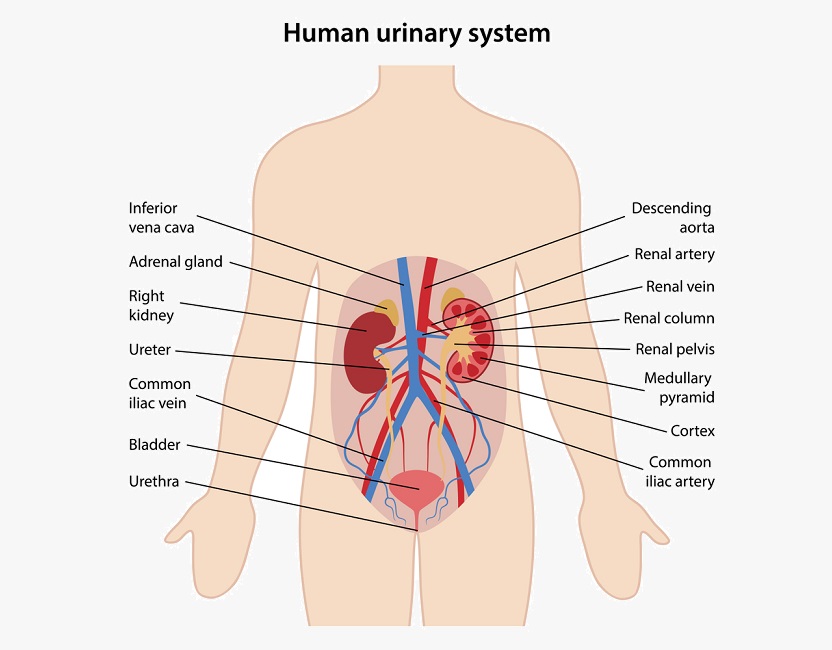
The urinary system is a complex network of organs and tubes responsible for filtering waste products from the blood and eliminating them from the body through urine. The kidneys, located in the upper abdomen, are the primary filtering organs, while the ureters, bladder, and urethra form a series of tubes that transport urine from the kidneys to the outside of the body. The urinary system plays a critical role in maintaining the body’s fluid and electrolyte balance, regulating blood pressure, and eliminating toxic waste products.
The kidneys are bean-shaped organs located on either side of the spine. They receive approximately 20% of the blood pumped by the heart and filter about 200 quarts of blood every day. This process removes waste products such as urea, creatinine, and excess water from the blood, which are then eliminated as urine. The kidneys also play a crucial role in maintaining the body’s acid-base balance, producing hormones that regulate blood pressure, and helping to produce red blood cells.
The ureters are two muscular tubes that carry urine from the kidneys to the bladder. They are approximately 10-12 inches long and are lined with smooth muscle that contracts and relaxes to move urine along. The ureters pass through the abdominal cavity and enter the bladder from below, connecting to the bladder wall through a small opening called the ureteral orifice.
The bladder is a muscular sac located in the lower abdomen that stores urine until it is eliminated from the body through the urethra. The average bladder can hold between 16-24 ounces of urine, although this can vary depending on age, gender, and other factors. The bladder is lined with smooth muscle that contracts and relaxes to expel urine from the body.
The urethra is a tube that carries urine from the bladder out of the body. In females, the urethra is approximately 1-2 inches long and is located between the clitoris and the vaginal opening. In males, the urethra is longer and passes through the prostate gland and penis before exiting the body through the tip of the penis. In addition to urine, the male urethra also serves as a conduit for semen during ejaculation.
The urinary system plays a critical role in maintaining the body’s fluid and electrolyte balance. The kidneys filter excess water and electrolytes from the blood and excrete them in urine. They also regulate the levels of ions such as sodium, potassium, and calcium, which are essential for proper nerve and muscle function. The urinary system also helps regulate the body’s acid-base balance by excreting hydrogen ions and producing bicarbonate ions.
The kidneys produce several hormones that play a crucial role in regulating blood pressure. One of these hormones, renin, is released when blood pressure drops, signaling the body to retain sodium and water to increase blood volume. The kidneys also produce erythropoietin, which stimulates the bone marrow to produce red blood cells, and calcitriol, which helps regulate calcium and phosphorus levels in the blood.
The ancient Egyptians were among the first to recognize the importance of urine in diagnosing medical conditions. They believed that the color, smell, and taste of urine could provide insights into a person’s health. For example, clear urine was thought to indicate good health, while cloudy or dark urine was associated with illness.
In ancient Greece, urine was used as a cleaning agent, as well as a medical diagnostic tool. Greek physician Hippocrates used urine as a way to diagnose a variety of medical conditions, including diabetes and kidney disease. He also observed that certain foods and drugs could change the color and smell of urine, and he used this information to develop dietary and lifestyle recommendations for his patients.
The first modern urinary catheter was invented in the 1800s. French surgeon Bernard-François Sédillot developed a flexible catheter made of a metal spiral covered in rubber. This design was easier to insert and less likely to cause injury than previous catheters, which were made of stiff materials like silver or ivory.
Urinary incontinence affects millions of people around the world. It is more common in women than men and can be caused by a variety of factors, including age, pregnancy and childbirth, neurological disorders, and certain medications. Treatment options include medications, pelvic floor exercises, and surgical procedures.
Kidney stones are a common condition that can cause severe pain and discomfort. They are formed when minerals and salts in the urine crystallize and stick together, forming small, hard stones. Kidney stones can be treated with pain medication, fluids, and medications to help the stones pass. In some cases, surgical procedures may be necessary to remove the stones.
The kidneys are vulnerable to a variety of diseases and disorders, including glomerulonephritis, pyelonephritis, and polycystic kidney disease. These conditions can cause damage to the kidneys and lead to chronic kidney disease, which can eventually progress to kidney failure. Treatment options may include medications, dialysis, or kidney transplant.
Urinary tract infections (UTIs) are a common bacterial infection that affects the bladder and urethra. They are more common in women than men and can cause symptoms like pain or burning during urination, frequent urination, and cloudy or strong-smelling urine. UTIs can be treated with antibiotics.
The urinary system plays a crucial role in the body’s immune system. The kidneys filter blood to remove waste products and bacteria, while the bladder and urethra help to eliminate harmful bacteria from the body through urine. The urinary system also produces substances like lysozyme and uromodulin, which can help protect against bacterial infections.
The first successful kidney transplant was performed in 1954. Surgeon Joseph Murray transplanted a healthy kidney from one identical twin into his brother, who was suffering from chronic kidney disease. The transplant was a success, and the recipient’s body accepted the new kidney as its own.
The urinary system can be affected by a variety of environmental and lifestyle factors. Smoking, for example, can increase the risk of bladder cancer, while exposure to certain chemicals and pollutants can damage the kidneys. Drinking plenty of fluids, maintaining a healthy weight, and avoiding tobacco and alcohol can help reduce the risk of urinary system disorders.
The urinary system is closely linked to the reproductive system. The urethra, which carries urine out of the body, also serves as a conduit for semen in males. In females, the urethra is separate from the vagina and does not play a role in reproduction.
The urinary system undergoes changes as we age. The kidneys may become less efficient at filtering waste products from the blood, while the bladder may lose some of its elasticity and capacity. This can lead to an increased risk of urinary tract infections and urinary incontinence in older adults.
The urinary system can be affected by a variety of medications, including diuretics, which increase urine production, and antibiotics, which can alter the bacterial balance in the urinary tract. It is important to talk to a healthcare provider before starting any new medications to understand the potential effects on the urinary system.
The color and odor of urine can provide clues about a person’s health. Clear, pale-yellow urine is a sign of good hydration, while dark urine can indicate dehydration. Strong-smelling urine can be a sign of dehydration, as well as certain medical conditions like a urinary tract infection.
The bladder can hold between 300-500 ml of urine before the urge to urinate is felt. However, individuals with overactive bladder syndrome may experience a frequent and sudden urge to urinate even when the bladder is not full.
The average adult urinates approximately 6-7 times a day, but this can vary depending on a person’s fluid intake, diet, and activity level. People with certain medical conditions, such as diabetes insipidus or diabetes mellitus, may experience increased urine output.
The urinary system has several sphincter muscles that help regulate the flow of urine. The internal urethral sphincter is made of smooth muscle and is involuntary, while the external urethral sphincter is made of skeletal muscle and is under voluntary control.
The urinary system plays a crucial role in maintaining fluid and electrolyte balance in the body. The kidneys filter waste products and excess fluid from the blood, while also regulating the levels of sodium, potassium, and other electrolytes in the blood. This helps to maintain the body’s fluid and electrolyte balance, which is essential for overall health and well-being.









